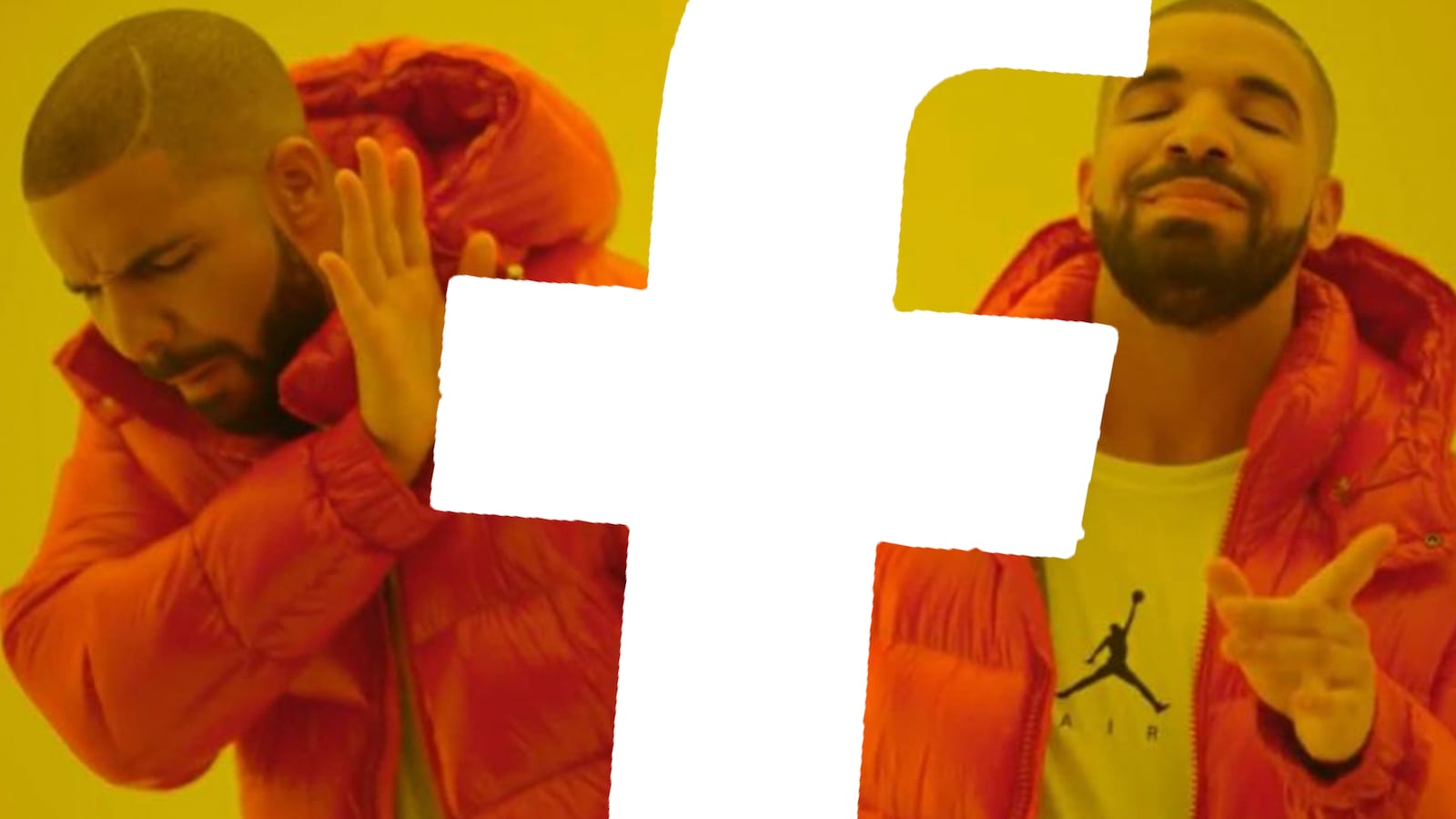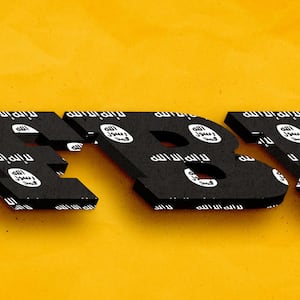Jihadists have a thing for Drake. Not his music, but his now omnipresent internet meme showing contrastive images of the rapper reject something in disgust and then welcome something else as just the ticket.
Since the loss of the Islamic State’s physical caliphate two years ago, ISIS supporters have been grappling with their diminished relevance online, reinventing their propaganda through a range of bizarre strategies, from pornographic ultraviolence to meme-based shitposting. In fact, ISIS’s virtual caliphate has grown exponentially since 2014, when black-clad terrorists stormed into the Iraqi city of Mosul, facing little resistance from the Iraqi military. Not ones to be outflanked by the alt-right, QAnon, or MAGA-minded militiamen, ISIS supporters have spent the last half-decade or so creating their online community complete with its own winking argot, much of it derived from seemingly counterintuitive items lifted from American popular culture. ISIS fanboys love Breaking Bad, SpongeBob Squarepants and Iron Man.
Unlike the terror network’s official propaganda portals, which are still limited to earnest and messianic content, these memes aren’t hosted on encrypted platforms. They’re readily available on Facebook, the world’s largest social media company.
Their largest Facebook page is the 11,000-follower strong “Company for the ‘Clanging of the Memes’,” which is in and of itself a play on ISIS’s notorious “Clanging of the Swords” video series released in 2012, as equal parts snuff film and recruitment effort. The “company” specializes in collating the latest jihadist memes from across the internet with three primary interests: attacking the leadership of rival terrorist organizations, mocking the United States and its global “ineptitude” in the face of domestic civil unrest, and pining for the now-demolished caliphate.
These have long been the themes of jihadist discourse; what’s different this time is how images from recognizable TV shows and blockbuster Hollywood movies are being used to peddle them. And while technology companies automate the process of wiping “99 percent” of official terrorist videos and content from their sites, a younger generation of ISIS supporters reared on likes and lulz carry on unencumbered. They deride Silicon Valley’s efforts to silence them with memes of a beheaded Mark Zuckerberg—hosted on Zuckerberg’s own platform. And they eschew the earnest appeals to messianic Islamism that characterized their predecessors with arcane in-group references, laden with the kind of smirking nihilism and pseudo-irony typical of other online subcultures.
The same instinct that led the far-right anti-government Boogaloo movement, which took its name from a cult ’80s movie about hip-hop dancers turned online meme, is leading ISIS cheerleaders to co-opt their own viral symbolism.
“Drakeposting,” after all, came from video game message boards on the platform 4Chan, the primary digital forum for white supremacists and incels. And there are plenty of ISIS Drakes to go around. There is the War on Christmas Drake who says yes to Santa hats, and no to disbelievers—a menacing warning to “liberal Muslims” not to partake in any yuletide festivities. There is Hardcore Jihadist Drake, who says no to Abu Mohammad al-Julani, the founder of the Nusra Front, the former al Qaeda affiliate in Syria, and yes to the balaclava-wearing militants of ISIS. Then there is the Islamic Conquest Drake, tricked out in a turban, who rejects the idea of a Muslim world only relegated to the Middle East and North Africa and a sliver of Spain, but endorses an expanded one stretching across Africa, most of Asia, and parts of the United States and South America.
ISIS doesn’t just use images of Drake as an arbiter on what they like and don’t like; they also edited his photos into images of a soon-to-be-beheaded hostage in an orange jumpsuit—his punishment for rejecting the Koran.
ISIS memes of SpongeBob Squarepants also build on what prior online shitposters have done, including one scene of the underwater invertebrate holding a fish and asking him to come closer as he sputters “I need...” over and over again, climaxing in the revelation: “a Prophetic caliphate.” Another meme has SpongeBob’s boss Mr. Krabs, his neighbor Squidward, and his best friend Patrick sitting around a table, with Krabs and Squidward preoccupied with “the demise of populations with the rise of global protests and lawlessness” and “global governments on the brink of economic collapse.” Patrick sits between them, grinning because ISIS “is waiting for the prime time.”
Many of ISIS’s meme attacks are focused on trash-talking opponent jihadists, including al Qaeda leader Ayman al-Zawahiri (now rumored to be dead) and the Nusra Front commander al-Julani. Breaking Bad’s Walter White is al-Zawahiri in the eyes of al Qaeda supporters, and al-Julani is Walter White in the eyes of Nusra supporters. In reality, according to ISIS, both are Jesse Pinkman’s band of idiot meth-head friends Badger and Skinny Pete from the popular AMC series.
This is an audience also conversant in the Expanded Marvel Universe, using superheroes and supervillains as a means of galvanizing those who might otherwise condemn comic book mythology as un-Islamic. Thanos, the genocidal alien of The Avengers, typically plays the role of America and Europe, while ISIS is cast as Tony Stark or Iron Man. As with its cooptation of SpongeBob, the gay-friendly talking sea creature, ISIS is either oblivious or indifferent to the fact that Robert Downey Jr.’s character was formerly the embodiment of America’s military industrial complex turned U.S. government-contracted counterterrorist.
That ISIS has developed its own digital subculture might be easy to dismiss as a harmless side effect of its growing real-world obsolescence but for the fact that the terrorist group continues to recruit willing executioners around the world. As of late, ISIS attacks have increased in Syria, Iraq, Egypt, Nigeria, Mozambique and Afghanistan.
As the greybeards of al-Baghdadi’s generation get killed or captured on the battlefield, we should expect to see more of this youth-oriented recruitment drive, borrowing liberally from what other digitally hatched extremist groups have pioneered. Nothing illustrates this fact more than the co-option of Pepe the Frog. The alt-right symbol is now firmly a part of online jihadist sub-cultures. Jihadi Pepe, like his far-right counterpart, takes umbrage with Salafis, and the Muslim Brotherhood, just as much as Westerners. Pepe the Takfiri channels the “us against the world” narrative espoused by Islamic State fighters. ISIS studies the West as much as the West studies ISIS and the jihadists are all too well aware that what begins with Pepe the Frog avatars culminates in Charlottesville.







